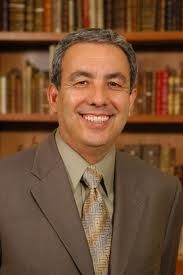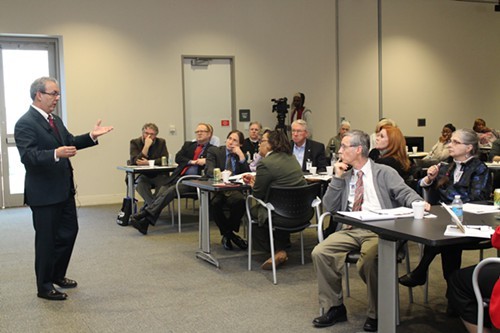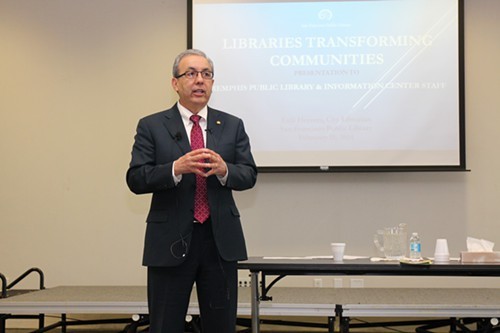“I’ve got goosebumps!” Inger Upchurch said last Friday afternoon. “He talked to us like he was one of us … a brother.”
Upchurch, librarian with the Memphis Public Library, was leaving a meeting room on the ground floor of the Benjamin L. Hooks Central Library after listening to Luis Herrera speak. But Herrera, city librarian of the San Francisco Public Library (and a man named Librarian of the Year by Library Journal in 2012), was in town to hear from Memphis’ librarians too. Herrera’s immediate reaction:
“You’ve got a strong talent pool here. I was impressed.”
[jump]
Herrera was in Memphis on the invitation of Keenon McCloy, director of the Memphis Public Library, who travels throughout the country and meets with librarians who have, in her words, “amazing minds and innovative ideas.”
“I wanted to bring that back to Memphis for the benefit of our staff,” McCloy said.

The meeting with Herrera — attended by 60 or so staff members drawn from across the Memphis Public Library system — was on February 21st. And that night, Herrera met with library trustees and members of the Friends of the Library and the Memphis Library Foundation. According to Diane Jalfon, director of the foundation, Herrera urged support groups to act as advocates for libraries and advised them to use their circles of influence to ensure that our libraries remain viable, because, contrary to popular belief, libraries are more important than ever. Why? Because they provide free access to information — a critical service in the digital age.
“Significant for me was learning that we’re providing all of the services that the San Francisco Public Library is providing,” Jalfon said by email of Herrera’s talk on Friday night. “And we’re doing it with fewer resources. We couldn’t do what we do without our strategic partnerships: our trustees, the Friends of the Library, and Memphis Library Foundation. They all help to reaffirm that Memphis truly has a world-class library system.”
Add to that system plans for a Teen Learning Lab. According to Jalfon, the fund-raising goal for the learning lab is $1.5 million, with $578,000 raised so far. And according to McCloy:
“Luis was the person we most needed to hear from about teen services. The San Francisco Public Library is opening its own digital learning lab for teens. Memphis is working to raise funds for such a lab here at the Central Library. So this was an ideal time to bring Luis in to talk about what’s working for San Francisco, what their plans are.
“The Central Library is an architectural gem and amazing place to be and to serve our customers — 2,500 people per day at this location alone,” McCloy added. “When children walk in the door, they know where to go: They run for those ‘trees’ in the children’s department. But right now, teens don’t have a place to call their own. We need a place that meets them ‘where they are.’ Our Teen Learning Lab will focus on building skills for the 21st-century workplace while tapping into teens’ interests and curiosity.”
McCloy described the plans for the lab: 8,300 square feet in a space now devoted to current best-sellers (which will be moved to another location inside the Central Library); space to accommodate traditional learning, in addition to audio and video equipment; room for coding classes and a practice room for public speaking; and exhibition space.
“It’s an exciting plan to meet traditional and nontraditional ways of learning — a plan where teens can not only learn but learn to express themselves,” McCloy said. “It’s a wonderful project that fits the library’s mission: satisfying the customers’ need to know. We’re here to eliminate barriers to access, create opportunities, and improve the workforce in Memphis. And literacy, of course, is the key.”
Looney Ricks Kiss, the Memphis architectural firm that designed the Central Library, will be the lead architects for the Teen Learning Lab. Margaret Sullivan, who’s been a leading designer of library spaces for teens (including “DreamYard” in the Bronx and “ImaginOn” in Charlotte), will act as consultant. The design and construction timetable, McCloy said, will depend on the library reaching its fund-raising goal of $1.5 million. (According to McCloy, the city of Memphis has budgeted for operations, including utilities and training/staff development.)
The Benjamin L. Hooks Central Library — open seven days a week — may be the perfect place for the lab, but don’t think library branches aren’t in on the plan as well.
“The lab at Central will be an incubator for a system-wide roll-out of teen services,” McCloy said. “A lot of people can’t make it to Central, so it’s critical that we value every location equally. Kids throughout Memphis deserve high-quality services. This project is designed to spark lifelong learning regardless of where you are. We’ll have equipment to share. Everyone will benefit from others’ experience. Sometimes the most innovative things are going on at the branch libraries.
“We’ve always had youth services, and with children we’ve done well. But not many teens want to go to the children’s department. The teen lab will put the spotlight on them, and we’re thrilled at the direction we’re taking and the possibilities. We believe in this. Everyone we’ve spoken to has said, ‘We love it and want to be part of it.’ It’s going to take community partnerships to make this the best it can be. We hope the funders agree. So far, we’re very encouraged.”
Luis Herrera was more than encouraged by what he saw.
“I’m a little envious, because your teen lab is going to be twice the size of what we’re proposing in San Francisco,” Herrera said in an interview after his meeting with Memphis librarians.
And what’s more:
Flyer: Do you mind going over briefly what you had to say today to our librarians?
Luis Herrera: Well, I talked about the planning process with our own teen digital lab. I wanted to stress leadership development too: librarians as change agents in the community — the difference they can make in the community.

You’ve got a strong talent pool here. I was impressed … the gentleman who runs the city’s archives and who’s digitizing photographs from Memphis history; the woman who runs the small-business center and connects with entrepreneurs. Those are impactful things for the city.
The facility you have here, the Hooks Central Library: I’m kind of blown away. And the Bookmobile’s job-tech outreach: We don’t have that!
San Francisco has a teen learning lab planned for its main branch. Memphis now has too. And other cities already have them. Why this uptick in teen services?
It’s a different world now. Teen services are designed to engage young people — our future leaders, the future advocates for libraries. But think of the way you or I learned in a traditional classroom setting. Learning is now much more interactive, much more experiential. Youngsters don’t want to be spoon-fed. They want to create their own learning experience. Libraries are perfect for that.
We call it “connected learning”: anything that happens outside the traditional school environment. You want to have what young people are interested in, not what we assume they should be learning. It’s almost peer-to-peer learning. Like Memphis, in San Francisco we’ll have a video and audio lab. Youngsters will learn how to use new media. It will be hands-on.
We’ve been planning now for 18 months, and we’re starting construction in the late spring/early summer. All the funding is in place. Construction documents are 90 percent complete.

And what are your impressions of the plans for Memphis?
Memphis is doing good stuff. The strategic plan calls for access to technologies. But I also talked today about taking a more proactive approach to engaging youngsters — “bringing it.” That means they have to be the ones telling us what they want. The success we’ve had in San Francisco is because the youth have felt they fully “own” it.
That’s key: ownership, the “buy-in.” It’s going to be their space. They tell us what’s going to work and what isn’t. In San Francisco, they did their own legwork too. They talked to peers. They came back to us for a “brain dump.” That’s putting it less than diplomatically, but it’s how our architects were able to pick out the best from the three plans proposed.
Tonight you’ll be speaking before the library’s trustees, friends, and foundation. What will be your message to them?
From what I already know, the Memphis Public Library has done good work in terms of key players from the community, engaging them. You’ve got some heavy-hitters here. They need a sense of ownership too.
The funding in San Francisco wasn’t pretty a few years ago. Then there was a kind of populist revolt that said enough is enough. Enough with cutting services, etc. During this economic downturn, we didn’t suffer any losses, and that’s remarkable. The community in San Francisco is very active. They hold our feet to the fire. They expect us to be held accountable. I told my staff: Funding support is a testament to the good work they do.
You meet with librarians across the country. What do you see as the biggest challenge for large, urban library systems?
The rapid pace of change in technology. The evolution from analog to digital. It’s revolutionary. It’s exciting. It’s still about literacy, but the formats are changing.
Our technology infrastructure is now becoming our bricks and mortar. We have to invest in broadband. We have to invest in our capacity to deliver information. Wi-Fi, for example. If the library is not equipped to provide that, we might as well get out of business.
Plus, there is still a digital divide, and that’s getting lost in the conversation. Not everyone has internet access at home. In San Francisco, we dispense laptops in a lending program. Seniors are coming to us with their Kindles and asking how to use them. Our staff is good about learning a bit ahead of the curve.
With the diversity in population and demographic changes — meeting those changes — libraries have been good at adapting. They’re neutral places. They’re welcoming, which speaks well to their role in community building.
I just heard one librarian say she had goosebumps from hearing your talk.
When I find an audience like the one I had today, it’s fun, it’s a conversation, they give back, it’s very open. And when I learn of the good things that are going on in a community, the people dedicated to serving the community, I love it, it’s very rewarding. But I have to be pretty selective about the traveling I do. I’ve got a day job, you know. It keeps me busy. •
For more on the Teen Learning Lab at the Benjamin L. Hooks Central Library and to make a donation, go to the Memphis Library Foundation’s website here and here.
Above photos of Luis Herrera meeting with Memphis librarians courtesy of Marcey Wright, public relations supervisor for the Memphis Public Library.